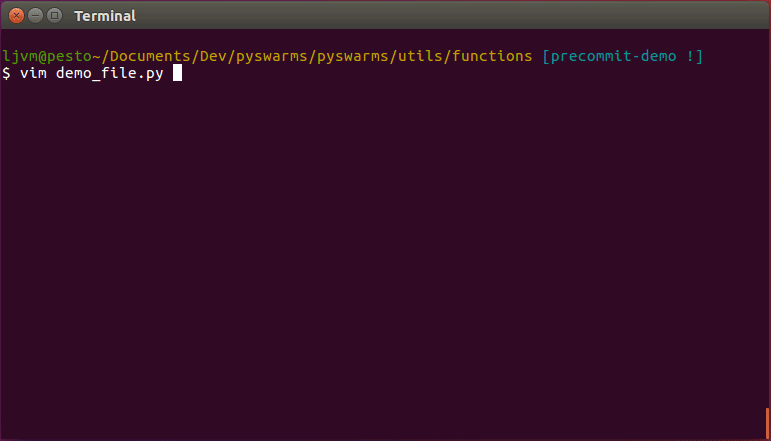Automate Python workflow using pre-commits: black and flake8
Before I commit my staged Python files,
blackformats my code andflake8checks my compliance to PEP8. If everything passes, the commit is made. If not, then I the perform necessary edits andcommitagain. Less time is spent on code formatting so I can focus more on code logic.
Code reviews are fun! They enable me to learn from other’s code while providing an opportunity to teach what I know. However, there are still some things I wish to improve when facilitating reviews in my open-source projects:
- Less time commenting on code format, and more time discussing code logic
- Less hassle spotting format errors (“can you really see that trailing whitespace on Line 76?”)
- Stop sounding nitpicky (“Please put two blank lines between function definitions”)
If I could automate the processes above and remove the human-in-the-loop, we
can focus more on code logic and implementation. Good thing, I learned about
Git hooks,
specifically pre-commit hooks. It enables you to automatically run a short script
before committing. This script can be a checking tool or a formatter. If the
script passes, then the commit is made, else, the commit is denied.
In this short post, I’ll describe how I created a pre-commit pipeline in PySwarms using the black code formatter, flake8 checker, and the pre-commit Python framework. The entire pipeline looks like this:

Figure: Pre-commit pipeline with black and flake8 for checking my .py files
I’ll first discuss the pre-commit framework, then add components one-by-one:
first is black, and then flake8. I will show the dotfiles present
in my project, so feel free to adopt them into your own!
The pre-commit Python framework
We can run shell files all we want to dictate how our pre-commit process goes,
but this pre-commit framework written in
Python got us covered. It even comes
with a set of pre-commit hooks out of the box (batteries included!). To adopt
pre-commit into our system, we simply perform the following actions:
- Install pre-commit:
pip install pre-commit - Add
pre-committorequirements.txt(orrequirements-dev.txt) - Define
.pre-commit-config.yamlwith the hooks you want to include. - Execute
pre-commit installto install git hooks in your.git/directory.
The YAML file configures the sources where the hooks will be taken from. In our
case, flake8’s already been included in this framework so we just need
to specify its id. On the other hand, we need to define where to source black
using few lines of code. Below is a sample .pre-commit-config.yaml file that I
use in my project:
repos:
- repo: https://github.com/psf/black
rev: stable
hooks:
- id: black
language_version: python3.6
- repo: https://github.com/pre-commit/pre-commit-hooks
rev: v1.2.3
hooks:
- id: flake8
Update (03-04-2020) You can also add flake8 from its own repo like so:
repos:
- repo: https://github.com/psf/black
rev: stable
hooks:
- id: black
language_version: python3.6
- repo: https://gitlab.com/pycqa/flake8
rev: 3.7.9
hooks:
- id: flake8
In the next section, I will discuss my code formatter (black) and checker
(flake8). As usual, I will provide my config files for each component.
Code Formatter: black
The black code formatter in Python is an opinionated tool that formats your code in the best way possible. You can check its design decisions in the repository itself. Some notable formatting decisions, in my opinion:
- Unlike in PEP8, code length is 88 characters, not 79.
- Use of double-quotes than single-quotes in strings.
- If there are many function args, each arg will be wrapped per line.
I’d rather maintain the recommended 79 character length. Good thing, they have
an option to do so. I just need to configure my pyproject.toml to
line-length=79 and everything is all set. Here’s my .toml file for
configuring black:
[tool.black]
line-length = 79
include = '\.pyi?$'
exclude = '''
/(
\.git
| \.hg
| \.mypy_cache
| \.tox
| \.venv
| _build
| buck-out
| build
| dist
)/
'''
If you are not a fan of black, there’s always autopep8— a formatter
more faithful to PEP8. Good thing, the pre-commit framework already has a hook
on this tool, so there’s no need to source from another repository.
Flake8 checker
Flake8 is a powerful tool that checks our code’s compliance to PEP8. In order
for black to work nicely with flake8 (or prevent it from spewing out various
errors and warnings), we need to list down some error codes to ignore. You can
check my .flake8 configuration below:
[flake8]
ignore = E203, E266, E501, W503, F403, F401
max-line-length = 79
max-complexity = 18
select = B,C,E,F,W,T4,B9
Results
So what we have is a pipeline that safeguards my project against wrongly-formatted code. In my project’s CONTRIBUTING page, I explicitly mentioned to use pre-commits (or run flake8 and black on their code manually) before submitting a Pull Request.

Figure: Pre-commit pipeline with black and flake8 for checking my .py files
Now that we have a pre-commit framework set-up with black and flake8, let’s see it in action! Here we’ll see how black formats a Python file automagically:

Figure: Short demo on pre-commit hooks
Awesome right? Hope you learned something new today!
Changelog
- 03-04-2020: Add setup for including flake8 from its own repo. Thanks, Alex Plugaru!
- 07-25-2019: Update github link of black from
ambvtopsf. Thanks, Peter Schutt! - 09-15-2018: Featured in Episode #95 of Python Bytes! Thank you Mike and Brian!
- 06-05-2018: Update pre-commit config filename (by @asottile)